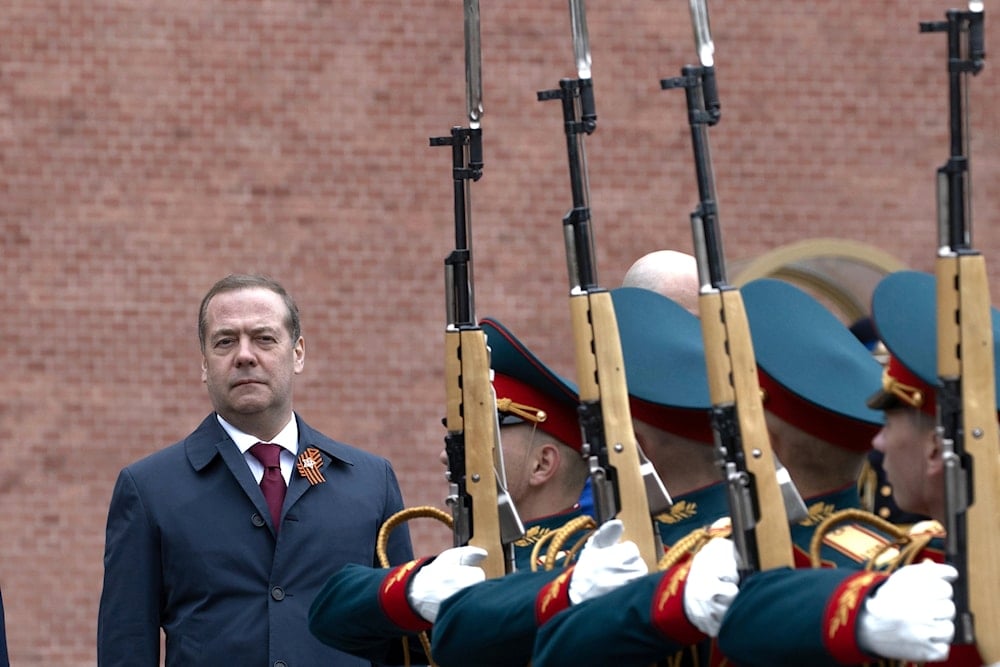Russia will not accept NATO troops in Ukraine as security guarantee
Russia rejects NATO troops in Ukraine, with Medvedev warning they would be “legitimate targets” as Moscow outlines its red lines.
-

Russian Security Council Deputy Chairman and the head of the United Russia party Dmitry Medvedev takes part at a wreath laying ceremony at the Tomb of Unknown Soldier on the eve of the Victory Day, in Moscow, Russia, Thursday, May 8, 2025. (Ekaterina Shtukina, Sputnik Pool Photo via AP)
In a post on X Wednesday, Russian Security Council Deputy Chairman Dmitry Medvedev stated that NATO troops cannot be peacekeepers in Ukraine, emphasizing that Russia will not accept such security guarantees for Kiev.
Earlier this week, French President Emmanuel Macron told TF1 and LCI broadcasters that Russia had allegedly become a "destabilizing force" and a "threat to Europeans."
"The brainless Gallic rooster [Macron] can't let go of the idea of sending troops to 'Ukraine.' It's been explicitly stated: NO NATO troops as peacekeepers. Russia won't accept such a 'security guarantee.' But the hoarse, pathetic bird continues to crow to prove it's king of the coop," Medvedev said on X, commenting on Western discussions about sending troops to Ukraine.
The brainless Gallic rooster can't let go of the idea of sending troops to 'Ukraine.' It's been explicitly stated: NO NATO troops as peacekeepers. Russia won't accept such a "security guarantee."
— Dmitry Medvedev (@MedvedevRussiaE) August 20, 2025
But the hoarse, pathetic bird continues to crow to prove it's king of the coop.
Reports on US and NATO security guarantees
Initially, some reports suggested that Washington had no fixed “red line” on sending troops to Ukraine. A senior US official told Politico that the possibility of deploying peacekeeping forces was not ruled out, saying, “I don’t think there’s a red line.”
However, the White House spokesperson later clarified that “US boots will not be on the ground in Ukraine,” though the US could provide coordination and military assistance to its European allies.
Meanwhile, a coalition of 30 countries, including Japan and Australia, is working on a framework of long-term security guarantees for Kiev. NATO Secretary General Mark Rutte said this effort is being led by UK Prime Minister Keir Starmer and French President Emmanuel Macron.
The initiative aims to secure Kiev’s military capabilities through commitments to maintain a strong army, deliver a major US weapons package, and expand domestic drone production.
Russia’s red lines
Russia has categorically rejected any NATO troop presence in Ukraine, even under a peacekeeping mandate. Foreign Minister Sergey Lavrov described such a move as an unacceptable threat, while Medvedev warned that NATO peacekeepers deployed without Russia’s consent would be considered “legitimate targets.”
Further, Russia has set outlined a set of peace conditions which include ritten pledge halting NATO’s eastward expansion, ruling out membership for Ukraine, Georgia, and Moldova.
Moscow has also demanded Ukrainian neutrality modeled on Austria, which would prohibit foreign military bases on its territory. In addition, Russia is seeking partial sanctions relief and the unfreezing of its sovereign assets, as well as guarantees for the protection of Russian-speaking populations within Ukraine.

 3 Min Read
3 Min Read










